

Jamaica has just completed its fourth week of three-day lockdowns, or no movement days, and private sector leaders are warning that many are on the verge of bankruptcy.
This is after news a few weeks ago (before the lockdown days) from the Small Business Association of Jamaica that 35 per cent of its members have closed down.
After all, no business or country can survive on a three-day workweek. Especially a country like Jamaica, where labour productivity is already low and falling every year (except for three years in the 80s) from 1972.
The truth is that this is not unique to Jamaica, as many countries have seen a significant fall-off in economic activity, and in the US for example, many persons are at risk of becoming homeless. The difference between the US and Jamaica is that they started at a much higher economic base, and they have taken steps to pump significant stimulus funds into the economy while in our situation we have been parading a higher fiscal surplus than projected.
Because of the economic downturn, before the three-day lockdowns, unemployment had already moved from nine per cent in April 2019 to 12 per cent in 2021, which saw an additional 30,000 persons not working.

On the other hand, the health experts will argue that lockdowns are necessary, as we have to control the virus. Something which I am not convinced about, as what is needed is more out-of-the-box thinking (and enforcement) than just to say let’s stop everything from moving and all will be better. I understand the difficult decisions that the government is faced with.
I recall in the early days of the virus places like the US, UK, and other countries had long periods of lockdown. As soon as they started to reopen, the virus came back with a vengeance, and in the US for example, this third wave (driven by the Delta variant) is almost as deadly as the last wave.
In our case, we had a total lockdown of St Catherine, which crippled the economy, and after that lockdown, we still saw a higher number of cases and deaths. What is important also is that after the lockdowns there was a significant economic decline.
The chart shows the new cases for three countries (US, Jamaica and Sweden). These two countries were used, as the US has been the poster child for COVID, and Sweden pursued a policy of no lockdown.
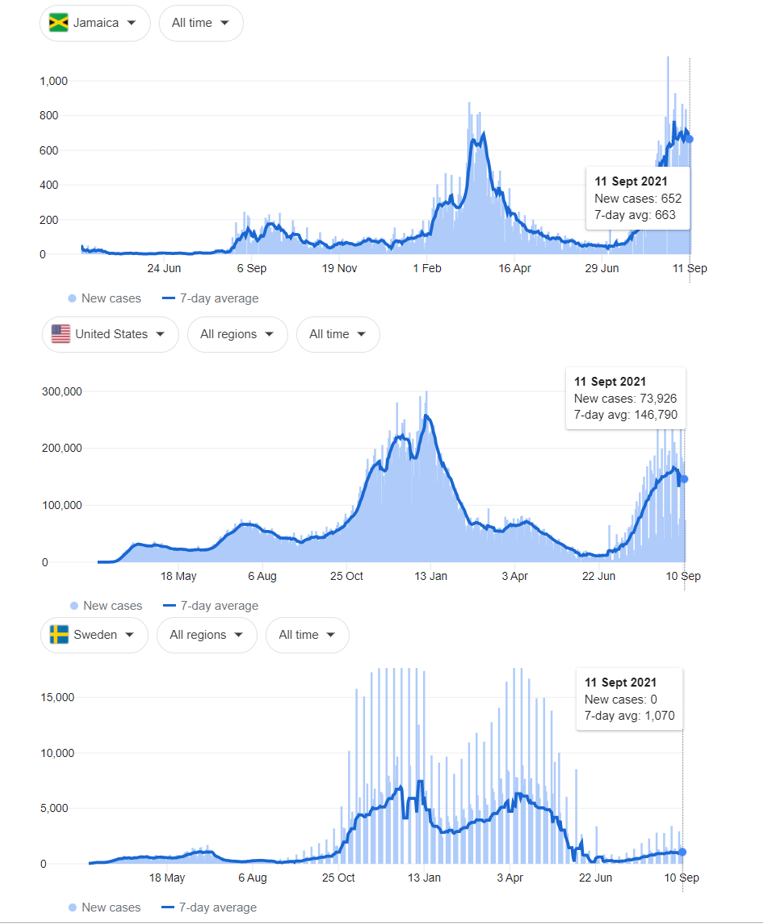
The US initially had significant lockdowns, while Sweden had no lockdowns, and had citizens taking voluntary precautions. In the case of Jamaica, we have played with lockdowns and long-standing curfews for over a year.
The chart shows clearly that the new cases in Sweden are significantly less in the third wave, where they also have the Delta variant, even though they had no lockdowns.
One will argue that what is important are the number of deaths and hospitalisations. Well, the US and Sweden have had significant hospitalisations, as well as Jamaica.
The difference is that the US and Jamaica continue to see significant hospitalisations, and deaths, while Sweden has recorded very low figures, averaging two deaths per day with the Delta variant.
In terms of death, many have said that the lockdowns are justified. But if that is the case, how does one explain the current four deaths per day average in Sweden ( a country with no lockdowns and has almost returned to normal) with the current average of over 1,600 deaths per day in the US and Jamaica showing over 20 deaths per day in recent times.
Both the US and Jamaica have gone through lockdowns and curfews.
The fact is that COVID-19 can only be beaten with the immunity of the population, like all other viruses. This immunity can be natural (from already contracting the virus) or high vaccination rates.
In the case of Sweden, their strategy was to pursue natural immunity of the younger population and also currently have over 50 per cent of their population vaccinated.
And of course, there are many, who don’t believe in the Swedish approach, who have said that it is the high vaccination rate that has caused the fall off in cases and deaths in Sweden.
This argument is not supported by the data, however, which shows that the US and Israel both have higher vaccination rates than Sweden, and both have higher death rates than Sweden currently.
With the US averaging over 1,600 deaths daily, Israel averaging 33 daily, and here in Jamaica, we are averaging 13 daily. The population in Sweden is greater than in Israel and Jamaica, which means that the per capita deaths per day are even more in favour of Sweden.
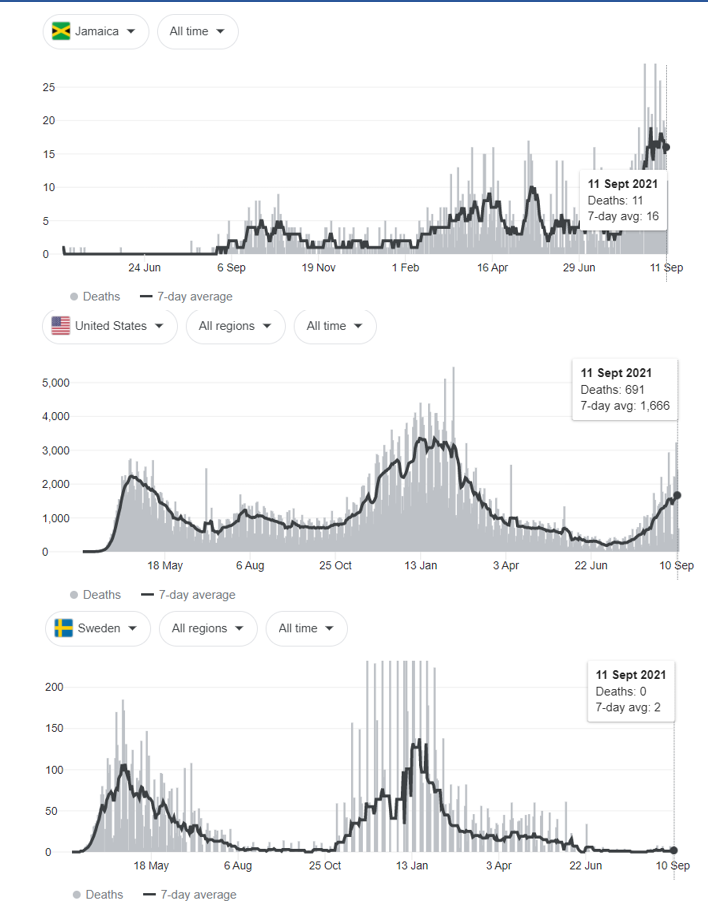
But many also argue that Sweden’s all-time deaths at 14,703, and death per million at 1,429, was a failure. And one can readily agree ( and they have admitted) that the main mistake they made was that they did not protect nursing homes. They did a poor job of this.
But even so, they are better than the US at 2,007, and 34 other countries, including many like France, Italy, Spain and the UK, which were famous for their lockdowns and now are mostly open and having crowds at sporting events, as we see on television while we salivate at having the same freedom.
Israel and Jamaica are still better at 818 and 588 per million, respectively, but here is the catch. These countries are still experiencing a relatively higher number of daily deaths. And certainly, in the case of Jamaica, the lockdowns in response are causing untold damage to our economy and society, which will have a dire long term effect.
GDP growth rates over the last six quarters show that the US has had an average quarterly negative 0.2 per cent, Sweden -0.4 per cent, Israel -0.8 per cent, and Jamaica (the one that can least afford it) is significantly worse at -5.6 per cent. More importantly, is that Jamaica’s contraction has been longer and deeper than many other countries and that will hurt…bad.
No doubt this economic impact is not only because countries like the US and Sweden are more structurally able to recover but these economies have substantially been open, while addressing the virus with measures such as masks, vaccine mandates, and strong enforcement.
So what does this tell us about finding the optimal COVID strategy. Well, the first thing is that we are all not created equally.
While countries like the US can print money with little concern, and create stimulus, places like Jamaica do not have that luxury and economic downturn for us is not like the US. We have accompanying things like crime.
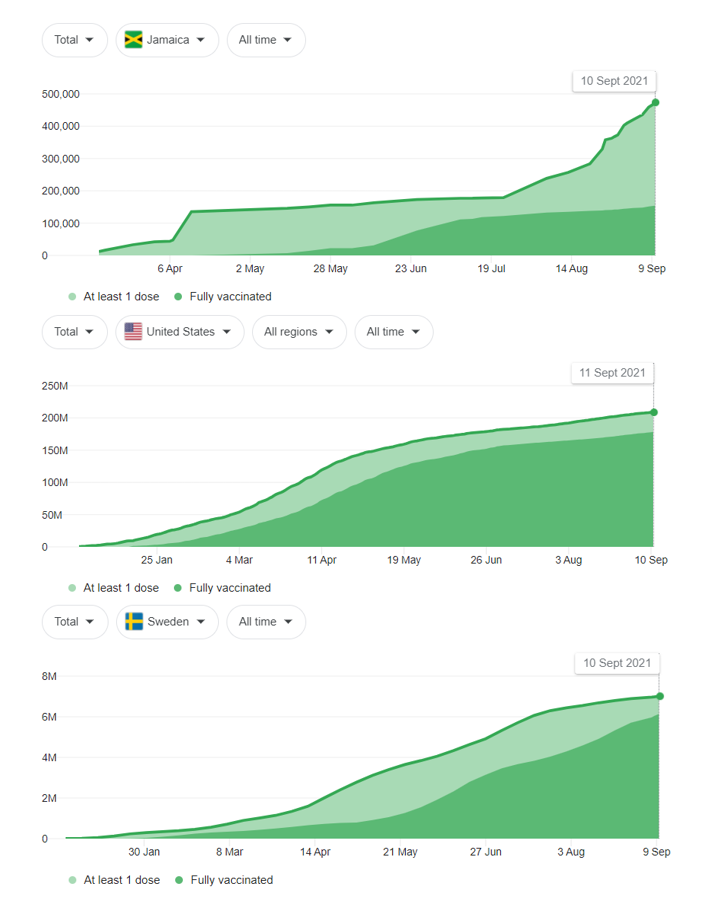
It also teaches us that lockdowns and curfews are not sustainable solutions, as we have seen places like the economically strong US shun those methods and are effectively back to normal activity. So if they can’t afford it, certainly we can’t.
(My own view is that the recent lockdowns are not what will cause the positivity rate to decline. The logic is that if you have 1,000 persons in your population and the positivity rate is 40 per cent and each person affects 1.1 others, then one can safely assume that as soon as the three-day lockdown is over then the spread will continue during and over the three-day lockdowns. In the next week, the 400 persons – 40 per cent – will infect an additional 440 persons, at the rate of 1.1, and it means in the third week there will only be 160 persons who are not infected and so the rate of infection naturally drop from 1.1 to a maximum of 0.36 because the virus has run out of hosts. So the fall was going to happen whether or not we had the lockdowns, especially with our lack of enforcement. But one can argue that the government had to act based on the information from the experts just as the Companies Act projects directors acting on expert advice.)
It also teaches us that vaccines are essential in our fight against COVID, and therefore it is not only important for us to source vaccines and bring them in but we have to ensure they are delivered efficiently and quickly.
And we also have to look at other solutions such as early treatment and not just suffer the consequences of waiting on vaccines with no alternative.

It may be necessary for the government, with private sector support, to start doing things like insisting that events such as plays, football matches, and other events can take place but can only be attended by vaccinated persons. But what we cannot do is see lockdowns and curfews as sustainable to kill the virus, as it will kill everything else and the virus will still be with us, as Australia is seeing.
So go get vaccinated, follow the protocol and make the right lifestyle choices. And for all the big babies who are afraid of needles, just suffer once and take the J&J, instead of having to maybe take many vaccines and other meds to fight a COVID infection, which you may not survive.
Dennis Chung is a justice of the peace and chartered accountant by profession. He can be reached at [email protected].

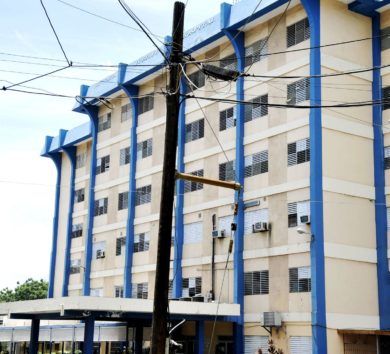


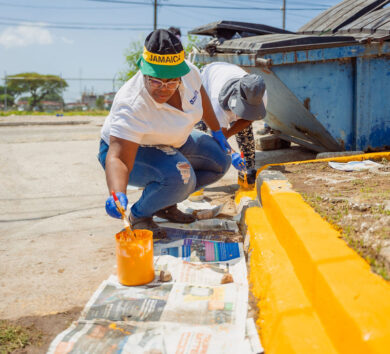


Comments